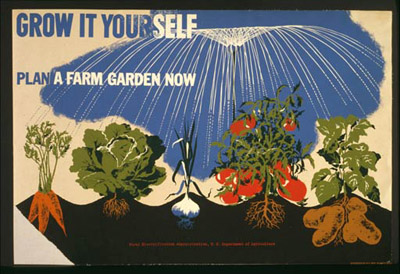
I hate to be the one to have to tell you this, but this whole Earth Day thing is really just a front for a cabal of dirt-loving luddites determined to destroy life as we know it in America. Dig down below that crunchy granola surface, that coalition of fruits and nuts (so annoyingly high in moral fiber) and you'll find a half-baked conspiracy to deprive us of some of our most cherished traditions: lush lawns unblemished by dandelions or dangling laundry; easy-to-heat, awful-to-eat cuisine; four wheel-drive vehicles with single digit gas mileage, and so on.
These terroirists hate our freewheeling ways, and, no, that's not a typo. It's a homegrown insurgency inspired by the French notion of "terroir"--the way that a specific region's soil and climate influence the foods and beverages produced there.
Wikipedia loosely translates terroir as "a sense of place;" locavores, aka food mile fanatics, describe it as "the taste of here." It's a foreign concept to most Americans, whose terroir tends to be the suburban supermarket; there's no "here" there, just overprocessed, overpackaged food that's traveled thousands of miles by truck, ship or plane.
We've been awfully piggy about our oil consumption, as Jad Mouawad noted in the New York Times last Sunday:
Keep in mind that we're only 4% of the world's population. A graph accompanying Mouwad's piece showed that other developed nations have managed to keep their consumption levels in check or even lower them significantly; Sweden and Denmark have reduced their oil use by 32% and 33% respectively.
Our oil consumption, on the other hand, rose 21% as we hitched our wagon to a fantasy of infinite--and cheap--fossil fuels, and went on building bigger houses, buying bigger cars, choosing longer commutes, eating more fossil-fueled fast foods.
Along the way, we glorified wastefulness and gluttony, converted fertile farms to sterile sprawl, stopped building sidewalks, marginalized mass transit, banned backyard clotheslines and front yard food gardens, and sent our soldiers off to die defending what is, at the end of the day, a pretty indefensible way of life.
And now we've got an agri-culture war here at home. Rising fuel and food costs, along with concerns about global warming, have given a growing army of "front-yard farmers," as the Wall Street Journal calls them, plenty of ammunition in their war to replace resource-hogging, planet-polluting lawns with food gardens. Read the objections from grass-addled neighbors who view these minifarms as a blight, and you'll see why Michael Pollan qualifies growing one's own food as a "subversive" act.
Pollan's the most high-profile combatant in the grow-your-own guerrilla campaign, his latest contribution being a piece in Sunday's New York Times Magazine's "green" issue that cites planting a vegetable garden as one thing an individual can do to combat climate change and shorten the food chain. But he's got plenty of company; Rip-Out-Your-Lawn-And-Grow-Veggies is a hot literary genre these days; in addition to Pollan's best seller, In Defense of Food: An Eater's Manifesto, there's Heather Flores's Food Not Lawns and Fritz Haeg's Edible Estates: Attack On The Front Lawn.
There are websites to inspire the would-be urban homesteader, too, such as Kitchen Gardeners International, whose founder, Roger Doiron, is on a mission to convince the next occupant of the White House to revive the wartime tradition of the victory gardens that provided us with plenty of homegrown produce during World War II. And The Path To Freedom website documents the astounding quantity of food one family produces on a fifth of an acre in Pasadena, California.
But the curb-your-carbon-footprint campaign doesn't stop at the curb; it's infiltrated the institutional food sector, too, as an article in Tuesday's Los Angeles Times noted. Enlightened eaters are encouraging university and corporate campuses to drop the mass-produced glop and start serving "real food," i.e. meals made with as many fresh, local, organically grown ingredients as possible. Efforts to reduce waste and compost kitchen scraps are becoming more common, too.
At the forefront of this movement is a coalition of students who are launching a national campaign called The Real Food Challenge, whose goal is to "create a food system that truly nourishes people, communities, and the earth."
In other words, a food system diametrically opposed to the one we have now; you know, the one that nourishes obesity, diabetes, animal abuse, worker abuse, pollution, and global warming. The one that our tax payer dollars have been underwriting even as it undermines us all, as Christopher Cook, author of Diet for a Dead Planet: Big Business and the Coming Food Crisis points out in an op-ed in today's Christian Science Monitor.
So how do these wild-eyed idealists define "Real Food"?
Aha! You see, they even admit that overthrowing our uber-consumer culture is part of their agenda. So don't be fooled by the rash of feel-good festivities and token tree hugging that inevitably breaks out around Earth Day. It's really an all-out assault on your right as an American to plunder the planet. Alert Homeland Security! Code Green! There's an elevated risk of attack by trowel-toting terroirists.